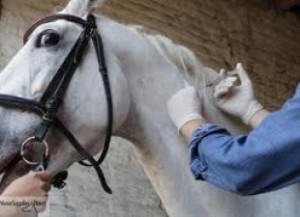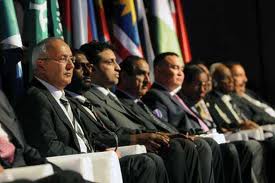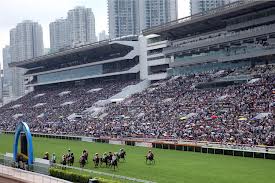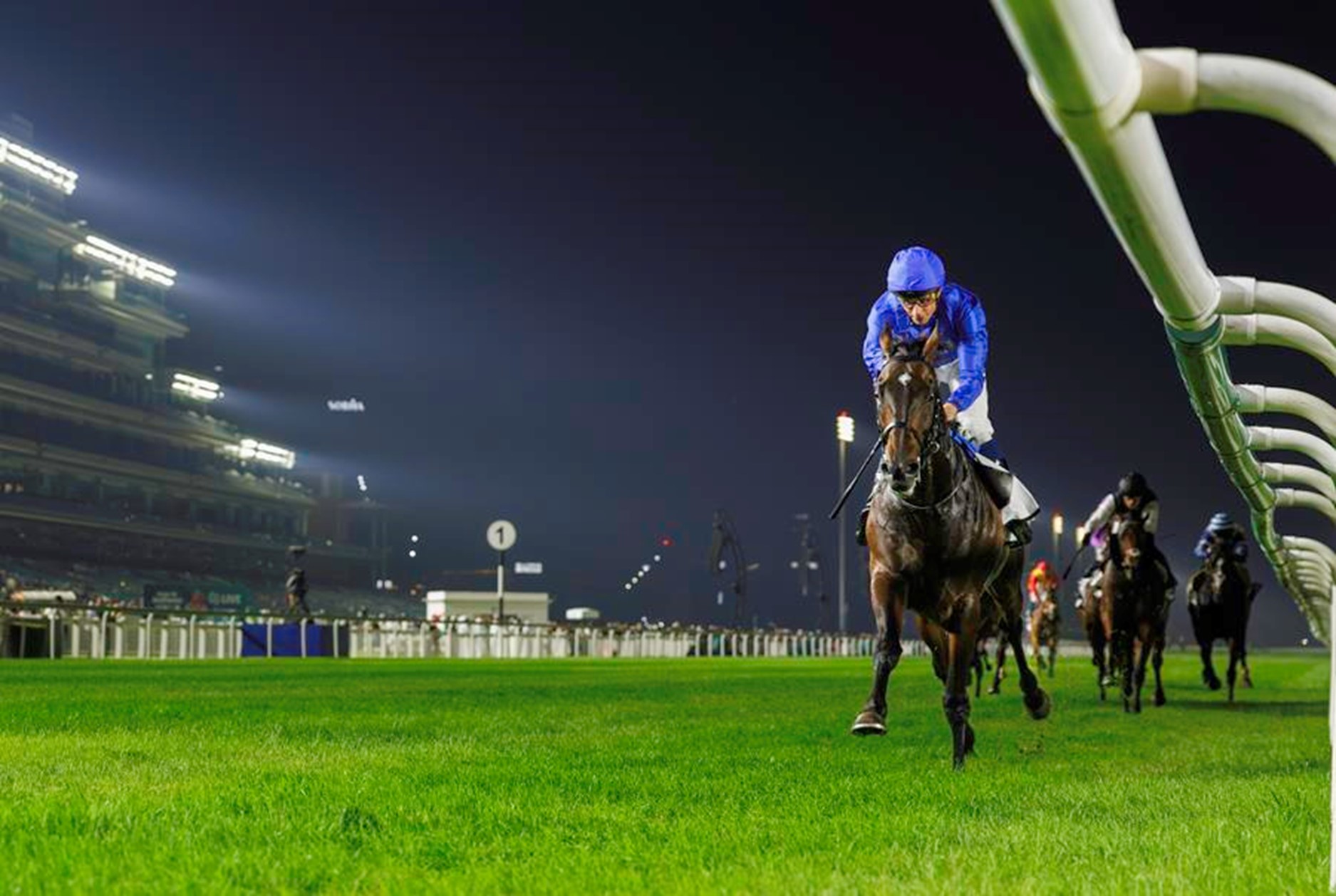The Chief Executive of the Hong Kong Special Administrative Region (HKSAR), Leung Chun-ying, struck a ceremonial gong to signal the start of the 35th Asian Racing Conference (ARC) during a stunning opening ceremony and gala dinner at the Hong Kong Convention and Exhibition Centre on Monday night.
The regional flag of the Hong Kong Special Administrative Region hung proudly alongside those of the Asian Racing Federation’s member nations and regions as Hong Kong Jockey Club Chairman Mr T Brian Stevenson welcomed a record number of almost 800 delegates, as well as media and invited guests, gathered from around the globe. The guests included Mr Louis Romanet, Chairman of the International Federation of Horseracing Authorities and Mr Ingmar de Vos, Secretary General of the International Equestrian Federation.
Mr Stevenson spoke of Hong Kong’s “amazing vibrancy and blend of cultures” as he addressed those present ahead of what is the world’s largest and most significant horseracing industry conference.
“Horse racing is one of Hong Kong’s world-class brands but equally importantly, its method of operation and structure is by way of a unique model of social innovation which benefits the entire Hong Kong community through the Jockey Club’s not-for-profit business model,” he said.
Dr Koji Sato, Chairman of the Asian Racing Federation (ARF), congratulated the Hong Kong Jockey Club on its 130th Anniversary during his opening remarks. “It is very fitting that the ARC is being held here in Hong Kong,” said Dr Sato. “Hong Kong is one of the leading racing jurisdictions in the world. It is a global giant in terms of its wagering operations, it stages spectacular international racing events and it has a highly respected role as a major contributor to charity and to the community.”
The Hong Kong community was well-represented during the evening as those assembled enjoyed harmonies from a local children’s community choir, an energetic, flag-waving representation from Shaolin Kung Fu and a performance by musicians from the HKJC Scholarship Scheme.
“We are particularly honoured that this is the third time that Hong Kong has been chosen as the host city for the Asian Racing Conference, the last occasion being 1991,” said Mr Stevenson, who outlined the massive growth in Asian horseracing over the past 20 years and the rise to preeminence of the ARC. “The ARC is now the largest racing conference in the world and is no longer just a regional gathering but is now one of the major forums and marketplaces for ideas for the racing industry worldwide,” he said. “This year’s 35th event has drawn a record attendance of almost 800 racing officials, administrators, executives and leaders in various business fields from some 40 jurisdictions, all motivated to embrace a common global vision for the development of this great sport.
“Between our 21 (ARF) members we now run over 55,000 races a year, almost 40% of the total worldwide,” he said. “We generated US$75 billion of turnover in 2012, nearly 60% of all the money wagered globally on horse racing; and we have developed substantial breeding operations, foaling some 35,000 high-quality thoroughbreds a year, again close to 40% of the world total. Most important of all, the ARF has become well-recognised for its innovative ideas, promoting the development of the sport.”
“The ARC is a global forum for industry leaders from around the world to meet together, identify emerging issues, and to develop new strategies,” said Dr Sato. “This is an exciting time for racing. We do face some challenges, but there is also a great deal that we can be optimistic about. By working together we are making great progress. 2014 is also the Year of the Horse, and that must be a good omen for our discussions this week.”
The three-day conference at the Convention and Exhibition Centre will consist of 15 seminars, featuring topics such as the future landscape for wagering, the use of cutting edge technology in sports broadcasting, the issue of drug control, the community impact of racecourses, and the international movement of elite horses.
A historic milestone was reached for the ARC when the Executive Council of IFHA met for the first time at an Asian Racing Conference
The International Federation of Horseracing Authorities (IFHA) is the Paris-based world body for thoroughbred racing. Its major functions include the quality control of International Race Planning and Grading (known as ‘black type’), the production of the LONGINES-sponsored Official World’s Best Racehorse Rankings, the setting of international standards relating to anti-doping and animal welfare, and the system of racing clearances for international competition. In addition, the IFHA works towards harmonization of the codes of racing rules around the world and fostering the commercial development of the racing industry globally. The IFHA Executive Council is the highest level of governance in world racing.
The Executive Council meeting considered major policy issues, including proposals on the international harmonisation of anti-doping control, forensic testing laboratory certification, and the genetic integrity of thoroughbreds. The Council also reaffirmed its strong support for the World Organisation for Animal Health (OIE), with which it is working hard on issues concerning the international movement of horses, including research into equine influenza.
The IFHA Executive Council consists of 13 members drawn from three regions – Europe, the Americas and Asia. It is due to meet again in Paris in October 2014 in conjunction with the running of the Prix de l’Arc de Triomphe.
HKJC Racecourse Operations Seminar
The outstanding reputation of the Hong Kong Jockey Club’s Racing Operations team resulted in an enormous turnout from across the world for the first ever Racecourse Operations Seminar, held at Sha Tin. Almost 200 delegates were in attendance to see presentations on a wide range of subjects relevant to racecourse operators everywhere, in an event organised by Mr John Ridley, Director of Racing Operations at the Hong Kong Jockey Club.
“I was delighted with the turnout today, which says much for the quality of our team here and for our international reputation,” said Mr Ridley, adding: “It has been a fascinating afternoon with colleagues from around the world, and the feedback has been terrific.”
The seminar was split into six parts, with five speakers from the Hong Kong Jockey Club and one from the Japan Racing Association (JRA). The subjects covered included: floodlight design, installation & maintenance and integration with broadcasting systems; benchmarks and performance parameters for racetracks; planning and renewal for sustainable tracks; and the HKJC racing talent management programme.
Mr Takaki Nagashima, Chief Starter of the JRA, presented on the philosophy of starts and starting gates, with the final session covering rail systems in the racing industry.
International Stewards’ Conference – progress on ‘big issues’ incl the protest / objection rule and penalties
The 5th International Stewards’ Conference was held at Happy Valley Racecourse and Chaired by Mr. Kim Kelly, the Hong Kong Jockey Club’s Chief Stipendiary Steward. The conference was attended by 71 delegates representing 28 racing jurisdictions.
One of horseracing’s most important Rules is the protest/objection Rule, which until relatively recently was operated in several different ways around the world. This issue was highlighted at the 31st Asian Racing Conference in Dubai in 2007, since when great progress has been made to harmonise the Rule internationally, thanks to discussions held during previous International Stewards’ Conferences and meetings of the IFHA’s International Harmonisation of Raceday Rules Committee.
There was further welcome news on that front at the Stewards’ Conference on Monday, when Mr Yoshihiro Nakamura, Chief Steward of the Japan Racing Association informed delegates of the results of a change to the protest/objection Rules in Japan that had taken place in 2013. The JRA had changed to the ‘Category 1’ philosophy which is widely used throughout Asia, Australasia, Great Britain, India, Ireland and South Africa.
Mr Nakamura reported that in 2012, there were 142 protest/objection inquiries conducted, with a change to the judge’s placings being made on 21 occasions. Of these 21 instances, 7 horses were disqualified as a result of being found to have caused interference which affected the result of the race, irrespective of where in the field the offending horse finished. By contrast, during 2013 there were just 25 inquiries with only one change to the result of a race. Further, there were no horses disqualified from a race for having caused interference.
 Against the background of events in various parts of the racing world over the past few months, another significant discussion at the Conference was held on the subject of the level of penalties that should be applied to serious offences, including the use of anabolic steroids and issues relating to animal welfare. On that subject, the Conference was pleased to note a report from Mr Johan Petzer, Chairman of Stewards at Thoroughbred Racing South Australia, concerning the introduction in Australia of mandatory minimum penalties relating to offences involving prohibited substances and animal welfare.
Against the background of events in various parts of the racing world over the past few months, another significant discussion at the Conference was held on the subject of the level of penalties that should be applied to serious offences, including the use of anabolic steroids and issues relating to animal welfare. On that subject, the Conference was pleased to note a report from Mr Johan Petzer, Chairman of Stewards at Thoroughbred Racing South Australia, concerning the introduction in Australia of mandatory minimum penalties relating to offences involving prohibited substances and animal welfare.
Some of the other subjects discussed on a wide-ranging agenda were: the provision of information by Stewards to the public through mainstream media and the increasing use of social media platforms; a study currently being conducted in Hong Kong regarding the health, fitness and welfare of jockeys; rules applying in certain jurisdictions regulating or prohibiting medication/treatment being administered to horses on or leading up to the day they are to race; and the benefits of interaction between Stewards and Security & Integrity departments.
Looking towards the increasing internationalisation of racing, further presentations examined: the possibility for protest/objection hearings being conducted in a harmonised manner around the world; and the merits of having jurisdictional gear/equipment registers to assist connections given the ever increasing movement of racehorses between countries.
(source: HKJC)











